What would Greece be like if it didn't have any olive trees? First of all, the fields would be bare: vast expanses of dry brown fields in the summer, damp green fields in the winter, absolutely useless terrain, good for taking a dog out for a walk while the person holding the leash jogs ahead of them. There also wouldn't be any olives to eat; instead of a few black olives in a Greek salad, there'd be a few capers, walnuts or almonds. And there'd definitely be no olive oil, so all our dishes would be cooked in water. Our food would taste a lot as Gilbert, a Jamaican soldier in WWII Britain, describes the food he ate in my favorite novel "Small Island" by Andrea Levy:
"...every last one of us was too preoccupied with food. The only flesh we conjured was the sort you chewed and swallowed. This was war. There was hardship I was prepared for - bullet, bomb and casual death - but not for the torture of missing cow-foot stew, not for the persecution of living without curried shrimp or pepper-pot stew. I was not ready, I was not trained to eat food that was prepared in a pan of boiling water, the sole purpose of which was to rid it of taste and texture. How the English built empires when their armies marched on nothing but mush should be one of the wonders of the world. I thought it would be combat that would make me regret having volunteered, not boiled-up vegetables - grey and limp on the plate like they had been eaten once before. Why the English come to cook everything by this method? Lucky they kept that boiling business as their national secret and did not insist that the people of their colonies stop frying and spicing up their food." (Read the next (very funny) paragraph, also related to food.)
Luckily for us Cretans, it was never like this.
 (kalitsounia fried in olive oil, gardoumia, dakos)
|
Every morning, as I take the children to school, I drive by olive fields. On the road, I pass countless pickup trucks, olive picking gear in tow: large nets to lay under the tree (usually black or green), a beating rod, a generator, among other bits and pieces. This means that the olives to be picked will be beaten, not allowed to drop naturally. Certain varieties (the one we call tsounates in Crete) are allowed to fall on their own, hence the nets, which allow the soil to breathe. They are laid over the ground below the trees and the owner of the filed goes there about once a week to gather whatever crops have fallen. This process is time-consuming, and it does not work for the lianes variety of olive, which has a stronger stem holding it onto the tree.
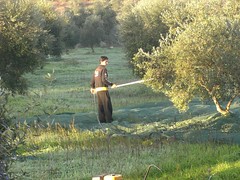
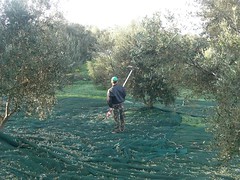
These nice young men (they were Albanian) were very obliging when I asked if I could photograph them. Their payment is often made according to the quantity of olive oil produced. This encourages them to work as fast as possible.
The nets are laid carefully under the trees and the beating starts. This was once done by hand with a large stick, but times have changed: a noisy diesel generator is now an essential element of the olive picking season. As each tree is shorn of its fruit, the nets are gathered up and the olives are poured into sacks, leaves and all at this stage. The sifting process was once done by hand, but this has now been made obsolete with high technology and the modern olive press: the olives are sorted mechanically at the factory. The sacks are piled onto the truck, to be delivered to the olive press. This process is repeated on all the trees. If the trees are close to the road, the nets are laid on the road. No matter how carefully you drive, sometimes you can't avoid driving over a net. This has happened to me countless numbers of times, as I live in a village setting with narrow country roads.
The olives - along with some of the leaves from the tree - quickly drop off the branches when they are beaten with an electric beating rod.
The olive pickers are mainly foreigners who have made their home in Greece: Albanians, Romanians, Bulgarians. They make good money doing this work; the owners of the fields are Greek, but they more often than not have another (main) job and cannot pick their own olives, not even as a part time activity, unless they literally have nothing else to do in their free time.
Our olive trees are no fun to work with at all...
Olive picking is a very tiring job, it must be done in its season and it is usually performed in cold weather. And it all looks like an easy job if your trees are on a level field; try picking them on a steep hillside, where each row of olive trees is on its own little strip of land, barely wide enough to walk by...
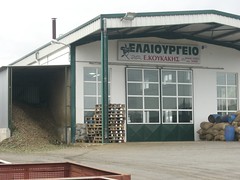
The olives are usually taken to a privately owned olive press located near the area they were picked; this one has a lot of customers waiting for their olives to be pressed. Notice the leaves on the left hand side of the building: they are used as fertiliser and a fire starter. Olive oil production also leaves sludgy residues which have to be disposed of in an environmentally friendly manner; it's not all as clean as it looks...
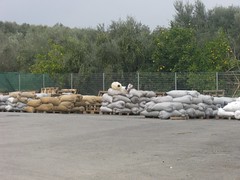
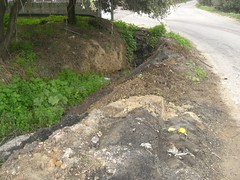
The olive trees get quite a beating from this rod (beating them by hand is very time-consuming and tiring, but much gentler the tree; it is hardly ever done now). This creates one more job for the olive pickers: the broken branches need to be cleared away from the field. This is what happen in the field before the olives get processed in the olive oil press. That's a totally different story. Check out Jude's blog to see the fresh olive oil pouring out of the press. What a sight...
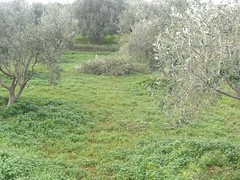
The end of the day - the olives have all been picked off these trees, and only the broken branches remain...
MAICh carries out a lot of research on olive cultivation, olive oil processing and the adulteration of olive oil. The findings are just as depressing as
So there you have it, in a nutshell: Greece can't even be bothered to make an effort to market its own natural resources. The next time you buy olive oil bottled in Italy, you know where it's really from: Greece. Yet, there is hope: advances in knowledge and technology have led to greater success in the fight against adulteration of olive oil; progress in DNA technology can now detect whether olive oil is purely from one region as well as being able to identify purely extra-virgin olive oil and adulterated oil mixtures (ie olive and non-olive oil mixes).
©All Rights Reserved/Organically cooked. No part of this blog may be reproduced and/or copied by any means without prior consent from Maria Verivaki.







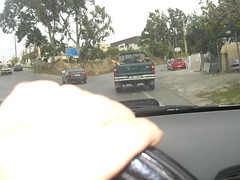




You taught us a master class in the Olive & Crete. Very well done, engaging. I feel lucky to have visited today! Aloha
ReplyDeletewow! thank you for giving us an insight into the olive growing/crushing/oil making process! it was a lovely read.
ReplyDeleteDAKOS!!!!!!
ReplyDeleteIn our area we do not have mechanical rods (ραβδιστήρες)...But then again maybe the fields are a bit smaller, so not so much work anyway.
The business side described in the last paragraph is a sad affair indeed :-( ....Indeed all of the bottled "Virgin Olive Oils" i can find in the supermarket are coming from Italy.
In one post you taught me more about olives than I thought I was ever going to know. I can safely continue to take a spoonful or two each morning.
ReplyDeleteIt's always great to see such a vital part of our (eating) lives in this way. There is far too little of it these days.
ReplyDeleteFascinating post!
Hi Maria! Interesting post! My wife's grandfather was an olive oil producer and I remeber how busy he used to be in November/ December... After he passed away (and the best olive oil in the world ceased to be produced... ;)), I sometimes try «Castello Zacro»; how do you rate it?
ReplyDeleteHave a great week-end!
Blogtrotter
I use olive oil or nothing at all. I don't even like to buy bottled salad dressing if it uses something else. I consider a major food group.
ReplyDeleteI love coming here and learning about this kind of thing, and yes, it is amazing to see it puring out (Jude's blog)!
ReplyDeleteVery interesting! And I thank Greece for the lovely black olives and olive oil that we use!
ReplyDelete